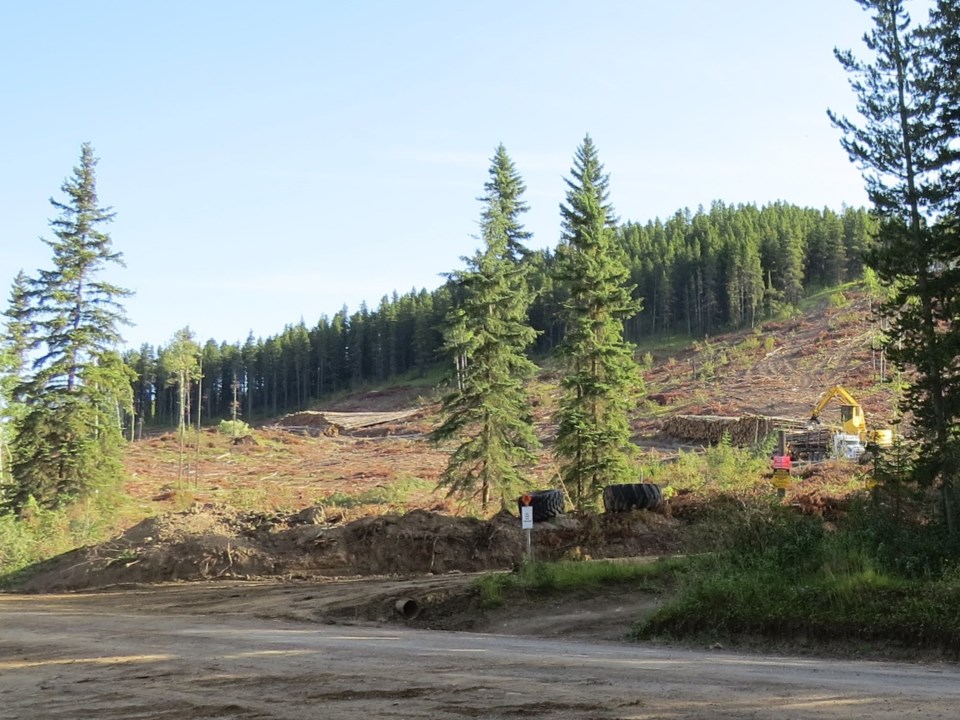West Fraser Timber released a report this week, entitled “What We Heard,” summarizing public feedback from an open house in Cochrane last May and also what adjustments they’re contemplating to logging plans for West Bragg Creek and Moose Mountain.
Opponents of any logging activity in the recreational area were not placated by the report. West Fraser has revised the planned 2026-27 cut downward by 37 per cent – still a long way from the 100 per cent reduction some stakeholders are asking for.
A random comment from one of the 700 attendees at two open houses (there was a second one in Blairmore May 9) illustrates the point.
“The West Bragg Creek Trail network represents the best area for X-country skiing within an hour’s drive from Calgary," the unidentified respondent said. "I would suggest prioritizing other areas for logging."
In the lead-up to the open house in May, West Fraser Timber made detailed maps available, showing the actual cut blocks in West Bragg Creek, along with the names of the biking/hiking /horseback trails affected, prompting anti-logging groups to declare their “worst fears realized” on social media.
West Fraser’s Chief Forester for Alberta, Richard Briand, told the crowd at the Cochrane meeting (and it was reiterated in this week’s report), that “Input from folks like you can really be helpful.”
West Fraser (formerly Spray Lake Sawmills) had planned to clearcut 900 hectares, (~833 soccer fields) near West Bragg Creek and another 450 ha. in the Moose Mountain Trail Networks. The total harvest planned for both areas, slated to start in October 2026 is now 556 ha.
In an interview with The Eagle this week, when asked if there was any possibility West Fraser might consider logging in a different area and even temporarily putting plans to log in West Bragg and Moose Mountain on hold, Briand was non-committal.
“We have made revisions to the plan already, and will continue to work with the groups," he said. "We’ve got another couple of years before we’ll be in there doing any planned operations.”
He said the company is now in the midst of gathering feedback on the report from stakeholders, and another open house is planned this spring.
Another sample comment included in the report reads: ”The planned clearcut logging would be devastating to this recreational area and have a devastating impact to myself and the other users of this area within Kananaskis (Country).”
It doesn’t sound like anything resembling a moratorium on logging is in the cards.
Any suggestions of possibility replacing the potential loss of timber supply with logs from an alternate area would be “very difficult” at this point, Briand said.
Lucy Curtis of Bragg Creek Wild said logging companies need to heed the words of world-renowned land use expert Brad Stelfox, who came to Bragg Creek for a presentation this spring.
“The land cannot be all things to all people, all of the time,” she said.
She said the province and the logging company need to go much further in protecting the heavily-used recreation area.
“Bragg Creek Wild believes that the West Bragg Creek/Moose Mountain area presently classified as unprotected “Multi-use Land” should be designated as a provincial park and be protected, adopting a management plan that emphasizes biodiversity and environmental sustainability,” she said.
Curtis said such a designation would balance conservation with recreation, ensuring the natural landscape is preserved for future generations.
“Precedence for such a move is set by Castle Provincial Park and Castle Wildland Provincial Park—which were designated protected areas in 2017 to curb logging and protect fragile ecosystems.
“The 2024 West Fraser “What We Heard” report attempts to placate trail users concerns by adding aesthetic buffers around logging zones but neglects essential ecosystem protections,” she said.
Curtis said the report vaguely justifies cutting for firebreaks, though its own data shows no firebreak benefit.
“The report fails to address key issues like safeguarding the Elbow River watershed, which supports half of Calgary’s population and nearby communities, and overlooks crucial wildlife habitats and migration corridors," she said. "It also lacks data on animal migration, sensitive areas, watershed boundaries, water accumulation, terrain types, existing open areas, wind impacts, and diversity of tree species and soil types."
The environmental advocacy group went on to call West Fraser’s engagement efforts insufficient, in that no research bodies were consulted.
“Similarly, there is no evidence of consultation with local Indigenous communities, including the Tsuut'ina and Stoney Nations, for whom Moose Mountain holds immense cultural significance.”
Canada’s softwood lumber industry got some sobering economic news just prior to the presidential election, as U.S. news agencies reported the southern United States is poised to surpass Canada’s long-held dominance over the North American lumber supply.
Industry watchers cited trade restrictions as the reason for the decline in Canadian imports.
President-elect Donald Trump ran on a platform of tougher tariffs on all imports. Analysts anticipate that levies — currently at 14.54 per cent — could double again by next year.
The U.S. region is set to eclipse Canada for softwood lumber capacity for the first time since 1970, according to commodity pricing agency Fastmarkets.
Canadian softwood lumber exports have declined due to years of U.S. duties and other challenges including wildfires, land use regulation and insect infestation.
The U.S. raised import duties on Canadian softwood lumber by almost 81 per cent in August, the latest move in a simmering four-decade dispute between the trading partners.
West Fraser Timber is the world’s largest lumber manufacturer, and along with smaller rivals Interfor Corp. and Western Forest Products Inc., has suspended or shuttered western Canadian mills this year.
Briand declined comment regarding what effect, if any, the new market conditions might have on their logging plans.




